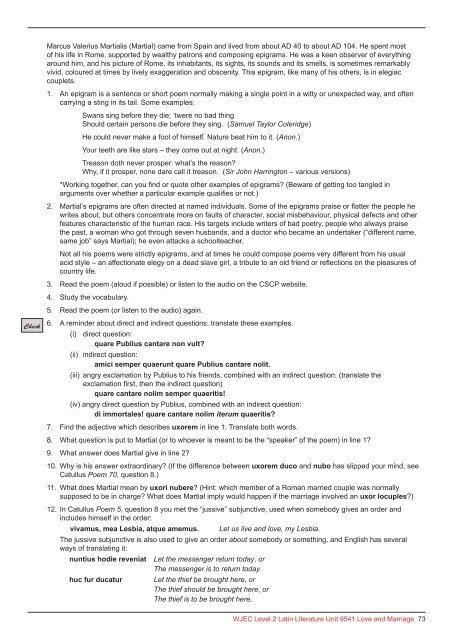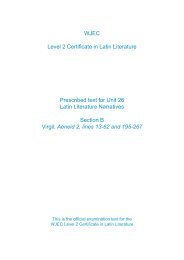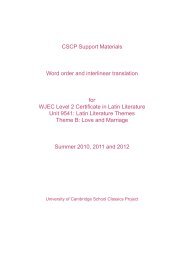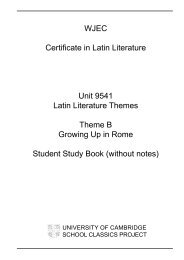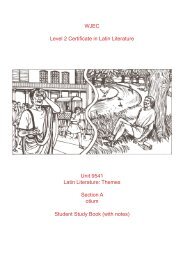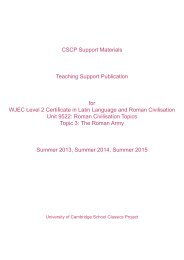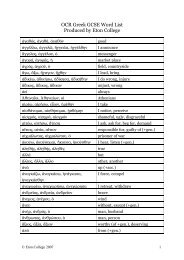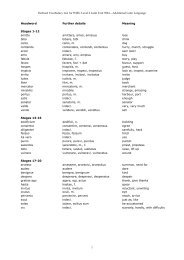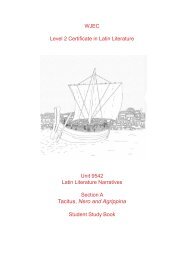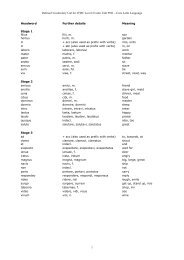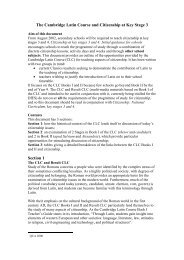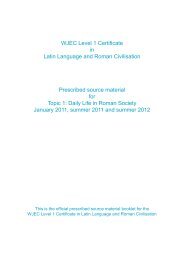2. Student Study Book - Cambridge School Classics Project
2. Student Study Book - Cambridge School Classics Project
2. Student Study Book - Cambridge School Classics Project
Create successful ePaper yourself
Turn your PDF publications into a flip-book with our unique Google optimized e-Paper software.
Marcus Valerius Martialis (Martial) came from Spain and lived from about AD 40 to about AD 104. He spent mostof his life in Rome, supported by wealthy patrons and composing epigrams. He was a keen observer of everythingaround him, and his picture of Rome, its inhabitants, its sights, its sounds and its smells, is sometimes remarkablyvivid, coloured at times by lively exaggeration and obscenity. This epigram, like many of his others, is in elegiaccouplets.1. An epigram is a sentence or short poem normally making a single point in a witty or unexpected way, and oftencarrying a sting in its tail. Some examples:Swans sing before they die; ‘twere no bad thingShould certain persons die before they sing. (Samuel Taylor Coleridge)He could never make a fool of himself. Nature beat him to it. (Anon.)Your teeth are like stars – they come out at night. (Anon.)Treason doth never prosper: what’s the reason?Why, if it prosper, none dare call it treason. (Sir John Harrington – various versions)*Working together, can you find or quote other examples of epigrams? (Beware of getting too tangled inarguments over whether a particular example qualifies or not.)<strong>2.</strong> Martial’s epigrams are often directed at named individuals. Some of the epigrams praise or flatter the people hewrites about, but others concentrate more on faults of character, social misbehaviour, physical defects and otherfeatures characteristic of the human race. His targets include writers of bad poetry, people who always praisethe past, a woman who got through seven husbands, and a doctor who became an undertaker (“different name,same job” says Martial); he even attacks a schoolteacher.Not all his poems were strictly epigrams, and at times he could compose poems very different from his usualacid style – an affectionate elegy on a dead slave girl, a tribute to an old friend or reflections on the pleasures ofcountry life.3. Read the poem (aloud if possible) or listen to the audio on the CSCP website.4. <strong>Study</strong> the vocabulary.5. Read the poem (or listen to the audio) again.Check6. A reminder about direct and indirect questions: translate these examples.(i) direct question:quare Publius cantare non vult?(ii) indirect question:amici semper quaerunt quare Publius cantare nolit.(iii) angry exclamation by Publius to his friends, combined with an indirect question: (translate theexclamation first, then the indirect question)quare cantare nolim semper quaeritis!(iv) angry direct question by Publius, combined with an indirect question:di immortales! quare cantare nolim iterum quaeritis?7. Find the adjective which describes uxorem in line 1. Translate both words.8. What question is put to Martial (or to whoever is meant to be the “speaker” of the poem) in line 1?9. What answer does Martial give in line 2?10. Why is his answer extraordinary? (If the difference between uxorem duco and nubo has slipped your mind, seeCatullus Poem 70, question 8.)11. What does Martial mean by uxori nubere? (Hint: which member of a Roman married couple was normallysupposed to be in charge? What does Martial imply would happen if the marriage involved an uxor locuples?)1<strong>2.</strong> In Catullus Poem 5, question 8 you met the “jussive” subjunctive, used when somebody gives an order andincludes himself in the order:vivamus, mea Lesbia, atque amemus.Let us live and love, my Lesbia.The jussive subjunctive is also used to give an order about somebody or something, and English has severalways of translating it:nuntius hodie reveniat Let the messenger return today, orThe messenger is to return today.huc fur ducaturLet the thief be brought here, orThe thief should be brought here, orThe thief is to be brought here.WJEC Level 2 Latin Literature Unit 9541 Love and Marriage 73


